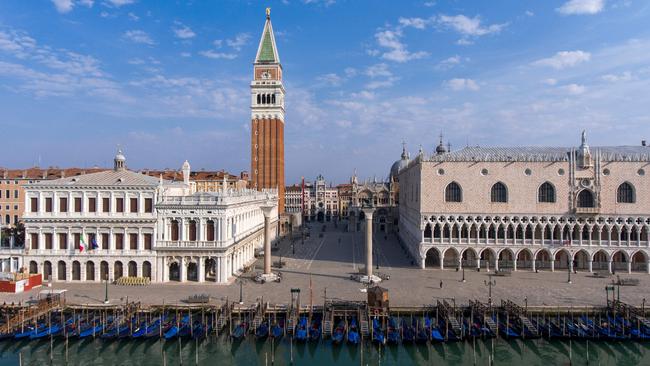Venice faces the winds of change in tourism
After complaining for years about being swamped by visitors, many Venetians fear the city will die for lack of tourism.

Thomas Mann linked Venice with mortality in his novel Death in Venice. But for me, it always seems full of possibilities, conveying an expanding sense of life.
This was reconfirmed when I spent four days there just before pandemic restrictions were introduced. The city was recovering from the cyclone in November last year, which had caused the worst tidal floods in more than 50 years. A major proof of its resilience was the reopening on schedule in July, despite what seemed insurmountable difficulties, of Teatro La Fenice Opera House.
Now that Venice has survived a nationwide lockdown, it is replaying the same card of artistic resilience, with the 77th Venice International Film Festival scheduled for September 3-12 and the Biennale of Architecture for seven months from May 22 next year. Moreover, masks, costumes, stage sets and choreographies are being prepared for Carnival 2021 in February, which will include the much-followed Doge’s Ball. This year’s Carnival was cancelled but organisers say they hope to see groups from Australia, which have always returned regularly, in 2021.
READ MORE: Silver linings in Venice | The downside of mass tourism | Dream becomes a nightmare |
Ironically, after complaining for years about being swamped by visitors, many Venetians fear the city will die for lack of tourism.
However other Venetians have enjoyed the quiet during the restrictions, the clearer lagoon in which fish were again visible, the freedom from the mob of an estimated 25 million tourists annually in central Venice, whose core population has dropped to about 55,000. For some, the lockdown opened the possibility of bringing university students, 30,000 in all, back to the central city from modern Mestre on the mainland, where they had transferred because their former accommodation had become B&Bs for tourists. The lockdown has revived hopes that Venice could become a real city again and not just a theme park.
The nation hopes to partially compensate for fewer foreign visitors by increasing the proportion of Italians holidaying in their home country from 55 per cent to 80 per cent. But so far, local tourists seem to prefer southern Italy, which had far fewer infections, over the hard-hit north.
The Veneto region, of which Venice is capital, followed a South Korea-type health program and had proportionally fewer victims than adjacent Lombardy, which was devastated. But for many, its image has been tarred with the same brush as Lombardy.
Venetian hotels have introduced severe precautionary measures but so far many Italian and foreign tourists prefer to go to nearby beach resorts and take day trips into the city.
In September, Venetians will choose what kind of tourism development they prefer. Businessman Luigi Brugnaro is seeking his second mayoral term, although he’s been criticised as being too close to cruise companies, whose ships loom over the Doge’s Palace as they pass by. The big shipping lines contributed €2m ($3.3m) to aid Venice after the November floods but cruising is still regarded by many residents as a symbol of excessive tourism.
Brugnaro, who complains the city has run up a €115m ($189m) debt during the pandemic, with no help from the national government, recently disclosed that his salary of €433,000 ($715,000) for his first five years has been given to help the city’s needy and would again be donated if he wins a second term.
His main opponent is Pier Paolo Baretta, a Venetian who was initially a trade unionist but has been undersecretary of the Finance Ministry in the past four national governments. Baretta, of the Centre-Left Democratic Party, has the support of the Greens and several small leftist and civic groups. He wants citizens, rather than tourism, as the focus of Venetian policies.
If elected, Baretta intends to improve the quality of Venetian tourism offerings, ban new hotels for five years, limit the number of day-trippers, many of whom come over from the former Yugoslavia, by introducing bookings, and increase the city’s permanent population through sustainable housing for young couples and university students, and expanded work opportunities for artisans. He told me: “I’ll not allow cruise ships near the Doge’s Palace.” The election result is uncertain. So is the future of Venice.

To join the conversation, please log in. Don't have an account? Register
Join the conversation, you are commenting as Logout